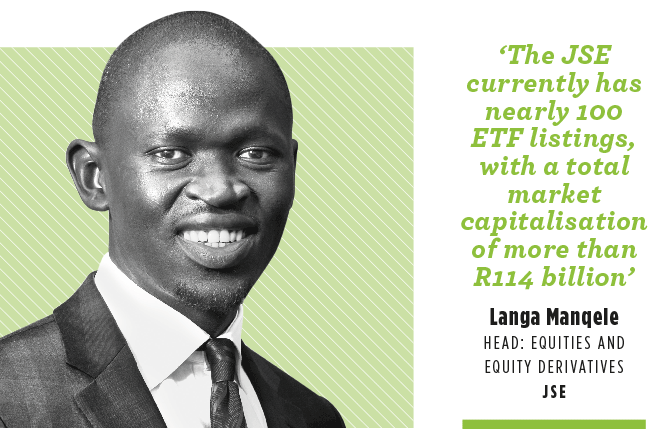Institutional investors dominate local investment markets, with retail investors – the personal investor who buys and sells shares for their personal portfolios – making up less than 10% of trade volumes. It was not always this way. In 1950, retail investors owned more than 90% of the stock of US corporations, according to a study published by Michigan Law School in 2009. At the time, the study notes, retail investors owned less than 30% and represented a very small percentage of US trading volume.
‘Retail activity was sparse for a long time,’ says Langa Manqele, Head of Equities and Equity Derivatives at the JSE. ‘But with the COVID pandemic, we saw a shift and spike in activity. This shows a very positive trend in the interest from individual investors to start investing and/or diversifying their investments. In 2019 the retail market represented less than 3% of overall activity in South Africa, and – this is a global phenomenon – that has jumped significantly since 2020. Retail-focused investment brokers have been increasing their activity, particularly in small caps.’
In 2022 the top 10 JSE brokers traded 60% of volume in small caps; mid-tier brokers, meanwhile, traded about 22% in volume. ‘So we’ve definitely seen an uptick, which is really good news for the retail investor given that its our ongoing focus at the JSE to provide increased investment opportunities for both our retail and institutional investors,’ says Manqele.
That’s good news for the market too because, despite their relatively low volumes, retail investors play a vital role in the market.
‘Institutional funds tend to be long only. So they don’t change their portfolios frequently outside of the usual index re-balance events. A market where the activity is primarily driven only by institutions can have very little churn,’ he says. ‘Retail investors tend to be event-driven, so they’ll buy or sell if dividends are coming, or if there is an event that they want to take advantage of.’
The JSE has moved quickly to provide innovative products for this growing force of retail investors. In September 2022, the Financial Sector Conduct Authority (FSCA) approved amendments to the JSE listings requirements that paved the way for issuers to list and trade actively managed certificates (AMCs) and actively managed ETFs (AMETFs) in SA for the first time. AMCs are non-interest paying instruments that pay the investor the performance of a basket of securities that is actively managed by a portfolio manager according to a specific investment mandate. AMETFs are funds that are traded on the market, whereby the investment manager uses an actively managed investment strategy to produce a return for the investor rather than utilising a passive investment strategy.
‘This came after extensive consultation between the JSE, FSCA and market participants, given the global ETF market’s evolution and the local industry’s desire to align with global best practices,’ says Manqele. ‘The JSE attracted several ETF listings in 2022, confirming its status as the leading exchange for capital-raising on the continent. The JSE currently has nearly 100 ETF listings, with a total market capitalisation of more than R114 billion.’
At the same time, Manqele has noticed an interesting dynamic around retail investments. ‘At the upper end of the market, some investors have capital that they would like to deploy offshore, but that can be quite cumbersome,’ he says. ‘This is where actively managed certificates become particularly interesting. Instead of taking cash offshore, you could just hold an AMC security, which tracks an actively managed reference portfolio of offshore securities. The AMC itself is listed at the JSE, trading in rands, [but] investors get offshore exposure. The reference portfolio adviser benefits from the alleviation of operational burden and friction costs associated with execution, managing corporate action events and exchange margining.’
This is a key selling point for both local buy-side clients and retail investors. ‘AMCs make it substantially easier to get unitised offshore access. AMCs could also incorporate an embedded FX hedge – Quanto – to remove the need for investors to have an active FX hedging strategy. In summary, you’re able to implement a unitised active mandate at a low Day 1 AUM, run an active offshore strategy without externalising the rand, and shorten time to market. AMCs are listed and traded in South African rands, so you don’t need to worry about offshore allocation limits or a tax clearance certificate,’ says Manqele.
No wonder then, that the proportion of retail investors is growing so rapidly. With a growing range of investment choices and easy access to global markets, the retail investor has never had it better.









